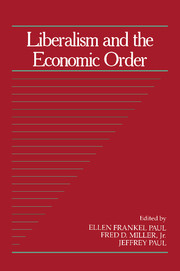Book contents
- Frontmatter
- Contents
- Introduction
- Acknowledgments
- Contributors
- The Social Market Economy
- From Post-Communism to Civil Society: The Reemergence of History and the Decline of the Western Model
- Asymmetrical Reciprocity in Market Exchange: Implications for Economies in Transition
- Institutions, Nationalism, and the Transition Process in Eastern Europe
- The Economic and Political Liberalization of Socialism: The Fundamental Problem of Property Rights
- Democracy, Markets, and the Legal Order: Notes on the Nature of Politics in a Radically Liberal Society
- Liberalism: Political and Economic
- Socialism as the Extension of Democracy
- Liberalism, Welfare Economics, and Freedom
- Some Rules of Constitutional Design
- The Morality of Inclusion
- A New Contractarian View of Tax and Regulatory Policy in the Emerging Market Economies
- Associations and Democracy
- Index
Liberalism: Political and Economic
Published online by Cambridge University Press: 05 October 2010
- Frontmatter
- Contents
- Introduction
- Acknowledgments
- Contributors
- The Social Market Economy
- From Post-Communism to Civil Society: The Reemergence of History and the Decline of the Western Model
- Asymmetrical Reciprocity in Market Exchange: Implications for Economies in Transition
- Institutions, Nationalism, and the Transition Process in Eastern Europe
- The Economic and Political Liberalization of Socialism: The Fundamental Problem of Property Rights
- Democracy, Markets, and the Legal Order: Notes on the Nature of Politics in a Radically Liberal Society
- Liberalism: Political and Economic
- Socialism as the Extension of Democracy
- Liberalism, Welfare Economics, and Freedom
- Some Rules of Constitutional Design
- The Morality of Inclusion
- A New Contractarian View of Tax and Regulatory Policy in the Emerging Market Economies
- Associations and Democracy
- Index
Summary
TWO LIBERALISMS
Political liberalism began in the eighteenth century with the effort to establish a secular state in which religious differences would be tolerated. If religious views include universal principles to apply to all by force if necessary, diverse religions must conflict, perhaps fatally. In a sense, then, political liberalism was an invention to resolve a then current, awful problem. Its proponents were articulate and finally persuasive. There have been many comparable social inventions, many of which have failed, as Communism, egalitarianism, and perhaps socialism have all failed to date. The extraordinary thing about political liberalism is that it seems to have succeeded in its authors’ initial hope for it. It may have helped end the turmoil occasioned by religious differences. Political liberalism has since expanded in various ways under other influences, and, if it were not for Islamic fundamentalism with its seemingly coercive theocratic program, we might no longer today associate religious conflict with the core of liberalism in its actual practice.
In contrast to political liberalism, economic liberalism more or less grew. It was analyzed and understood retrospectively rather than prospectively. It came into being without a party or an intellectual agenda. By the time Bernard Mandeville, Adam Smith, and others came to analyze it, they were analyzing characteristics of their own society. Insofar as they had programs, these were for reforms of political practice to end elements of state-sponsored monopoly and protection. But perhaps the large bulk of daily economic activity was already market-driven. Indeed, part of Mandeville's purpose was to give a moral (welfarist) justification for the supposedly immoral greed which drives markets to greater production.
- Type
- Chapter
- Information
- Liberalism and the Economic Order , pp. 121 - 144Publisher: Cambridge University PressPrint publication year: 1993
- 1
- Cited by



